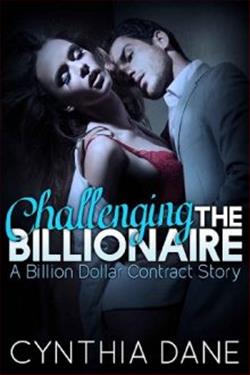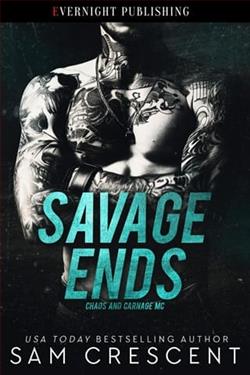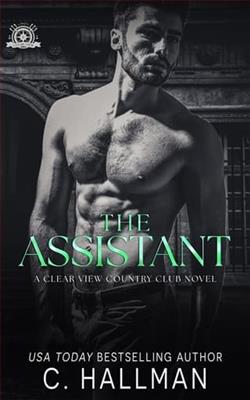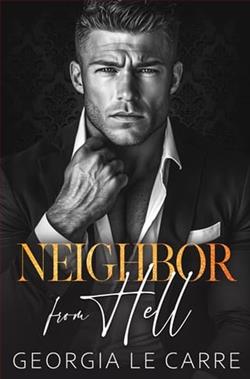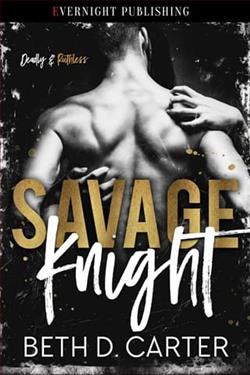Page 14 of Scr*wed By the Minotaur in Hallow's Cove
Maisie paused, expression open, almost inviting me to see past the surface. “I moved here for a man. Or, technically, a vampire.” She grinned, flashing slightly sharper canines than I’d noticed before. “Barnaby. He started the town over two hundred years ago. I met him when I came to town for a quiet break from my software job. We fell in love and eventually I convinced him to turn me.”
I blinked at her, caught between awe and the slow, pleasant horror of realizing I might be talking to an actual vampire in the produce aisle. “Wait. Are you—?”
She rolled her eyes, good-natured. “Oh, don’t get all weird. Most of what you think you know isn’t true. I don’t eat people. Or food for that matter, but Barnaby keeps a supply of cow’s blood in the freezer. At first it was… honestly? Nasty. Like drinking a cold, rusty smoothie. But you get used to it. Survival mechanism, I guess.”
She shrugged and tossed a bag of limes into my basket as if that explained everything. “There’s always an adjustment period for new beginnings, right? You’ll find your thing.”
I eyed her, trying to see traces of the monster beneath the cardigan and jeans, but all I saw was a woman who might have also sat on a park bench and cried her heart out once, then made peace with it.
“Is it weird?” I asked. “I mean, do you ever… wish you could go back?”
Maisie considered. “Sometimes. Not often. There’s stuff I miss, sure. The taste of real ice cream. A hot cappuccino. Butmostly I like what I’ve got now.” She bit her lip and leaned in as if sharing a truly illicit secret. “You know what the best part is about dying and coming back different?” She didn’t wait for my answer. “You do everything you always put off. No more waiting for the ‘right time’—the right time is every goddamn moment.”
Her words hardened in my chest like a diamond—tiny, perfect, irreducible. The ache of the morning was still there, but it was edged now with possibility, something sharp and sweet.
Maisie marched us through the aisles, loading my basket with the skill of a seasoned operator. Sourdough, olives, dark chocolate.
“Trust me,” she said, “chocolate is the only cure for heartbreak. Well, the only one that doesn’t leave a permanent record.”
I wanted to point out that heartbreak wasn’t supposed to be fixed with food, but what did I know? My coping mechanisms so far had included avoidance, overwork, and the occasional ugly cry in public. Wine and carbs seemed like an upgrade.
“What about you?” Maisie asked as we waited in the checkout line, loading groceries onto the belt with brisk precision. “What are you gonna do now that your world’s imploded?”
I thought about it. Really thought. The true answer was I had no idea, but sitting there with a stranger in the after-flare of a meltdown, I realized maybe that was sort of the point.
“I guess I’m going to open the shop,” I said. “Make it beautiful, even if no one comes. Maybe forgive myself for needing a do-over. Learn all the monster gossip. Try not to fall for another emotionally illiterate man-beast.”
Maisie beamed like I’d just passed a pop quiz. “That’s the spirit, kid.” She slid her card to the cashier, waving off my attempt to chip in. “You can pay me back later. I’m running a tab for all emotionally traumatized newcomers.”
We left the market, arms full of heavy bags and something lighter, too—a sense that maybe the worst was behind me. Maisie walked me back to my apartment the long way, down streets I hadn’t yet mapped. For a while, we didn’t talk, just let the newness of dusk and the hush of the neighborhood fill the space between us. A row of handmade wind chimes caught the breeze, a careful hedgerow lined a well-lit street, and a single porchlight burned gold in the growing dark like a pole star.
I got the door open, and we navigated through the construction site that was the shop and headed upstairs. At that point, I really needed to let Maisie go. She’d helped me enough for one day.
“Okay, shoo.” I waved my arms toward her after we deposited the last of the bags.
“What? No way. I have to help you put all the groceries away.” She blew her hair out of her face, clearly sweating.
“No, really. You’ve done enough. And…” I hesitated. “Dare I say I’ve made my first real friend in Hallow’s Cove?”
“Of course.” Maisie pulled me into a tight hug, then let me go. “You’re sure you don’t want more help? Or just more company?”
“I’m sure. Go be with your vampire.”
Maisie pulled me into another hug before heading out. Once she was gone, I sat down in the only chair I had so far—a single desk chair—and let myself relax for a bit. I was elated to have met Maisie but exhausted from the emotional trainwreck of a day. I let myself stare off into space for a bit before getting up to put away the groceries. I organized everything the best that I could with minimal furniture—the hand-me-down fridge from the former owner would work until mine arrived.
I looked at my watch. Somehow it was already 8:30 p.m. I needed to get back to the inn. I wasn’t sleeping here yet because the rest of my things weren’t due to arrive until Wednesday. I had learned most of the town in the two days I had been here,but I didn’t really want to walk back to the inn alone at night. I quickly shoved the rest of the groceries in the fridge, before grabbing some candy to take back to my room with me and headed out.
I was lucky that Hallow’s Cove only had a few main streets and I wasn’t far from the inn. I waved at one of the many rabbit shifter children working the desk and took the stairs up to my room. Then I threw myself on the comfortable bed, utterly exhausted.
Chapter seven
Rick
Ispentthehoursafter Lea left the shop in a kind of fugue—moving through the familiar motions, but with a persistent afterimage burned into my vision: her hands bracing the counter, her voice trembling with anger, the way she’d looked at me as if I’d yanked the ground out from under her and was now asking why she tripped. I bagged up orders, restocked the adhesive aisle, and repaired a couple leaky garden hoses, but all the while my mind stuttered around the simple, inescapable fact of her staying.
She hadn’t been lying about the building; I’d watched through the front window as she and Randy’s crew went after the old linoleum with a vengeance, crowbars gleaming in the light like swords in a war I’d already lost. She laughed at something Randy said and, even through the shared wall of our building, the sound hit me like a punch in the gut. I told myself I was keeping tabs to be a good neighbor. Maybe even to make sure she didn’t fuck up the building’s load-bearing beams.
That was a lie.








